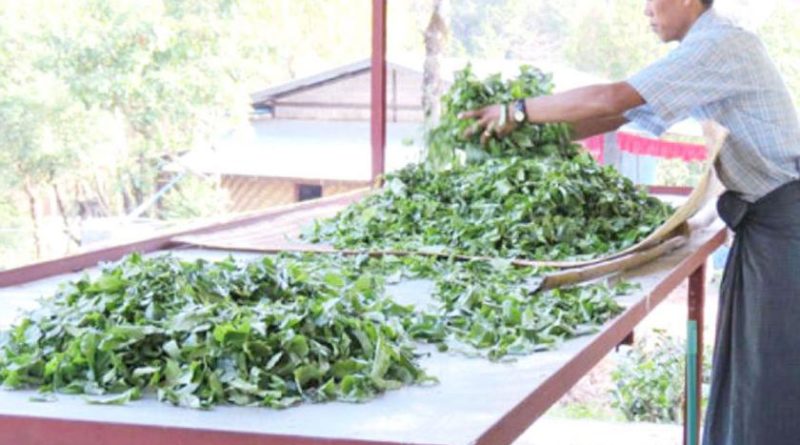SHAN STATE, Myanmar- Shan State’s peace and tea leaves

Among Myanmar’s many agricultural products, tea leaves hold a lot of potential for export markets because they are organic product grown naturally, an official with the Myanmar Tea Association says.
However, development of the sector is tied to conflict in Shan State, one of the main growing areas for the crop in Myanmar. If a truce is achieved, Myanmar’s tea exports will develop strongly, Myanmar Tea Association Vice Chair U Maung Lwin says.
.
ADS by Cloud 9:
.
– SPACE RESERVE FOR YOUR ADVERTISEMENT –

.
“Myanmar tea leaves are naturally grown without using any chemicals so we have many advantages. Frankly speaking, most of areas that produce tea leaves in Myanmar are affected by conflict-torn, and that is why we can’t seek qualify certifications. If there is peace, tea plantations could apply for quality certification and export more to China. There is a opportunity for a huge market to be tapped,” said U Maung Lwin.
In Myanmar, tea leaves from Kokang and Palaung have already gained a reputation as good product in overseas markets. But internal conflict remains a big challenge to expanding the production. To increase exports, it is the most important to increase production to meet market demands and seek quality certification, he said.
.
ADS by Cloud 9:
.
– SPACE RESERVE FOR YOUR ADVERTISEMENT –

.
“Because 80pc of tea plantations in Myanmar are situated in unstable areas, peace must be present first in order to obtain quality certification and expansion of production, never mind business expansion. Right now growers have to pick tea leaves amidst fighting and production has declined compared with other growing areas in China. Production costs are also higher than in other countries,” said U Maung Lwin.
There are some 8900 hectares of tea planted across Myanmar. In September, 52 tonnes of tea was exported to China according to the data from Ministry of Commerce.
While development of the sector does not look promising at present, Chinese consumers like the quality of Myanmar tea and as there is demand. If quality and production can be improved, the market may expand, U Maung Lwin said.
.
ADS by Cloud 9:
.
– SPACE RESERVE FOR YOUR ADVERTISEMENT –

.
There are international organisations that can grant quality certification documents and quality specifications for organic farms, he said.
“The Control Union that grants quality certification is here. In reality, there are difficulties to get the certificates. For example, my tea fields are in Kokang and I get organic certificate for this year by cooperating with Control Union. But, if fighting occurs next year, the certificate I received will be in vain. So, all the tea plantation owners don’t dare to obtain the certificates,” said U Maung Lwin.
Myanmar tea growers participated in the recent 16th China-ASEAN Expo and promoted dried and wet tea leaves and interest among visitors to the expo was reported to be high.
.
ADS by Cloud 9:
.
– SPACE RESERVE FOR YOUR ADVERTISEMENT –

.
“China does not focus on quality certification and this offers Myanmar’s growers an advantage. This point is a difference between China and western countries. Chinese people test the quality of tea by drinking it and they are satisfied only when are they allowed to test like that. We have to prepare to give them good quality. They have many questions and complaints because they know about tea. If we have quality certificates, we are able to expand the market,” he said.
Although local tea is also exported to Taiwan, Thailand, South Korea and Singapore, the largest market remains China.
“Peace in Shan State is very important for the tea sector. So, we want peace quickly,” said U Maung Lwin, an owner of tea plantations in Kokang region. – Translated
.
– SPACE RESERVE FOR YOUR ADVERTISEMENT –

.



















